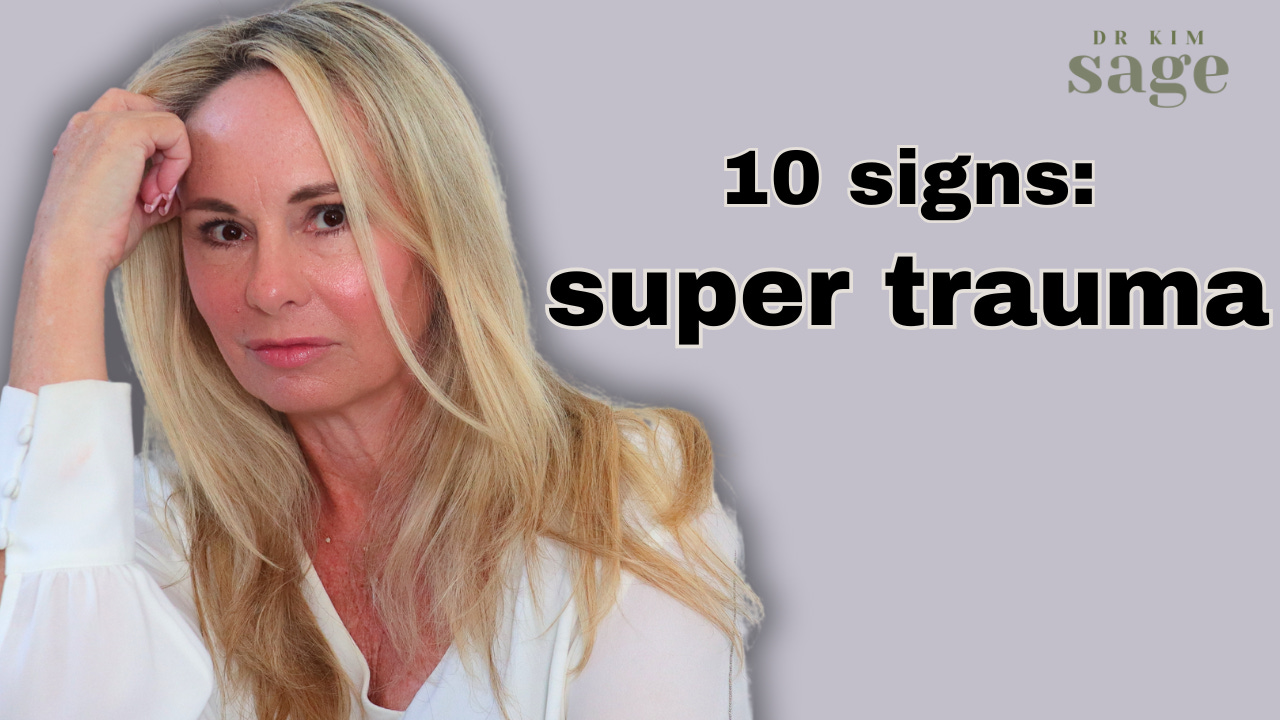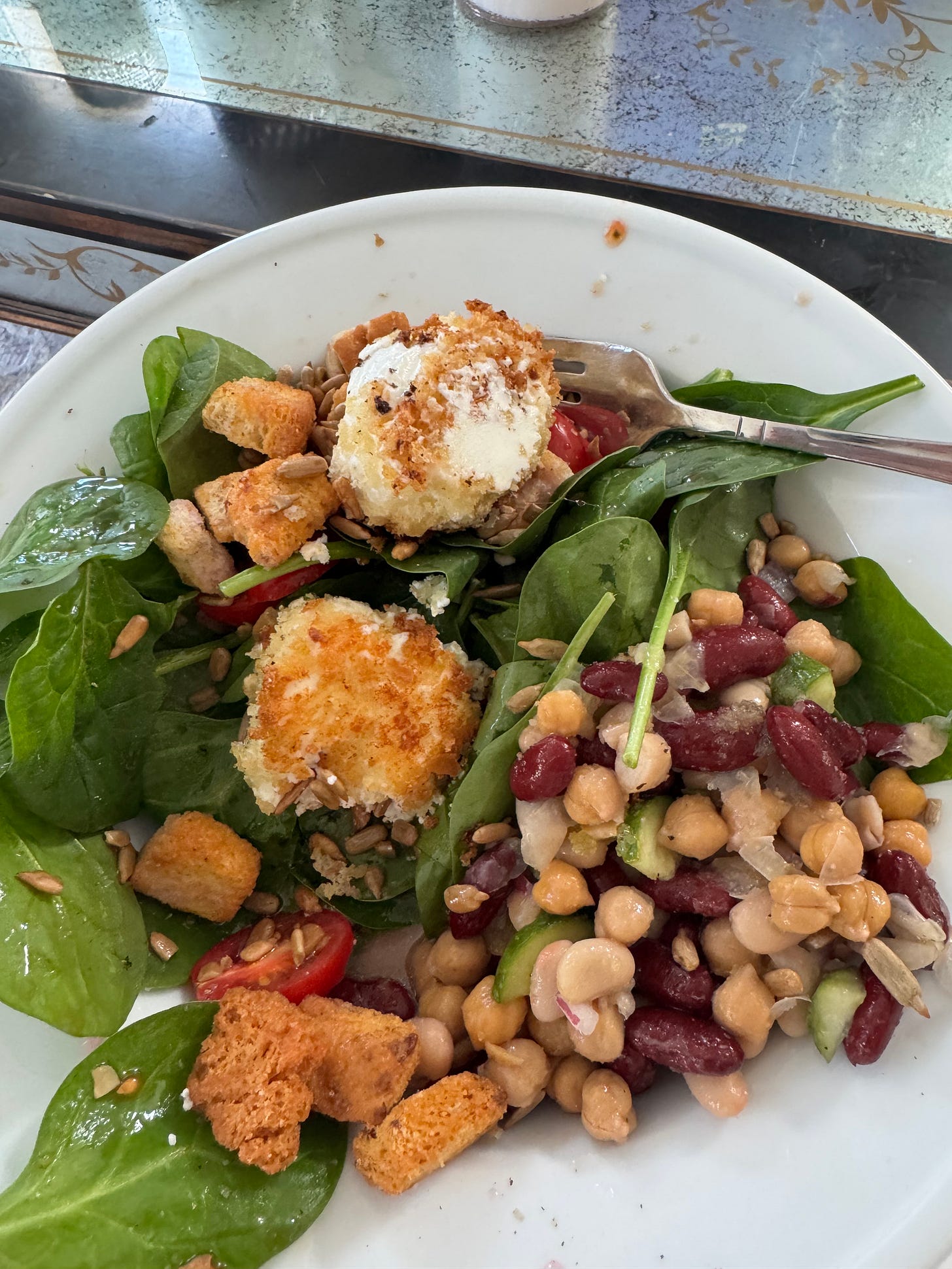The Super Traumatized
Multiple traumas, Anora Psych Film Review, Stress: Gut Health & Resilience
Since early December, two of my four children have been in hospitals - one with a serious illness, and the other with a serious accident (just last week), and my estranged mother was recently diagnosed with blood cancer after falling.
I haven’t been quite the same since November, if I am being honest. Now, could it be all be worse? Absolutely. I do know that it’s important to remember my gratitude, and I am an absolute professional at surviving.
Even my own therapist (who I’ve seen for so long now I can’t count the years), said to me a few years ago “Kim, you’ve had more trauma than almost anyone I have ever known— and you just never let it stop you. You always find a way.”
But what does one do with that? Like, ok, where’s my medal? Oh yeah, I don’t get one because “that’s just life, no one gets off easy.” And while that is 100 percent true, what do you do when you’ve had so much happen (aka multiple lifelong traumas) that it almost makes it hard to relate to anyone who hasn’t been through a lot?
What do you do when your life has almost been defined by multiple traumas, when you have been super traumatized, again and again?
As a psychologist, my trauma makes me compassionate and comfortably able to sit with people in their darkest hours. Cancer, divorces, infidelity, parenting pain, abusive and immature parents, LA fires, losing loved ones. You name it, I have sat with someone while they cried, raged, detached, dissociated, and healed. When it comes to work, I can relate in every manner, and it has never felt like I am comparing my life to someone else’s.
But where it shows up is in my avoidance, in my isolation, in my autism, and in my personal life.
When you’ve been on a trauma ride so long that the ride becomes who you are — when you’ve been not just traumatized, again and again, but super traumatized, what do you do?
Here are some key survival strategies that I work to return to, again and again:
1. Am I even in the present? Am I aware of how I move from one stressful event to another? Do I numb out, dissociate or binge watch/scroll to avoid being in the present? Why is it so uncomfortable to be in the present?
2. Am I moving my body? Do I move my body in any ways that feel good? What if I just committed to taking one long walk every day in a blue or green environment?
3. Am I feeling my feelings? Am I letting myself really feel and deal with what I am going through? Am I giving myself permission to feel a range of feelings that maybe I don’t want to feel? Anger? Sadness? Grief? Longing? Fear?
4. Am I taking care of my inner and outer child? Do I listen to my body cues of hunger, tiredness, connection, etc? Do I care for myself the way I would take care of a loved one? What little changes can I begin to implement?
5. How am I doing with saying yes, saying no? What am I doing to protect my peace? Am I giving too much access to negative people, negative content, etc in my life? What can I do, and how can I lovingly parent myself to stick to a boundary-layered plan?
6. What core wounds or old traumas are being activated here? What deeply held pains and stories remain unhealed, unprocessed, buried? Is there anything I need to let myself feel that I am avoiding? Can I write, talk, read, watch or share my pain with a safe, trusted other? Do I need therapy?
7. What’s happening with my isolating tendencies? Where does this help? Where might it be hurting me? What would I like to work on changing?
Link to YOUTUBE video: Super Traumatized
10 signs you're super traumatized and what to do
New Research:
Your gut microbes may influence how you handle stress

A study published this month in Nature Mental Health finds distinct biological signatures in the microbiomes of people who are highly resilient in the face of stressful events.
“For their analysis, Church and her team separated 116 adults without a mental health diagnosis into two groups based on how they scored on a scale of psychological resilience.
Next, they sifted through a huge amount of data gathered from brain imaging, stool samples and psychological questionnaires and fed that into a machine-learning model to find patterns.
This analysis of gene activity, metabolites and other information came up with several key associations in the high resilience group. In the brain, there were increased features related to improved emotion regulation and cognition.”
“Think about the cognitive part, or the frontal part, of your brain being like the brakes,” says Church. “The highly resilient individuals had really efficient brakes, and less of this hyper-stressed response.”
Easy Recipe Gut Health:
Beans are good for gut health because they are high in fiber and protein, which helps with digestion and promotes healthy gut bacteria.
Bean Salad From Ingredients I already have in the kitchen:
For the salad:
1 (15-ounce) can cannellini beans, rinsed and drained
1 (15-ounce) can kidney beans, rinsed and drained
1 (15-ounce) can garbanzo beans, rinsed and drained
1/2 red onion, finely chopped (about 3/4 cup), soaked in water to take the edge off the onion
1 - 2 cups lightly cooked fresh green beans or cucumbers
1 cup loosely packed, fresh, finely chopped flat-leaf parsley
Feta Cheese
For the dressing:
1/3 cup apple cider vinegar or preferable vinegar
1/4 cup granulated sugar (more or less to taste - I only use if I am using apple cider vinegar
A touch of dijon mustard if you like it!
3 tablespoons extra virgin olive oil
1 1/2 teaspoons salt
1/4 teaspoon black pepper
Anora: Psychological Film Review
This is going to be a psychological review. If you haven’t seen the film and don’t want spoilers, please stop reading now!
Anora, directed by Sean Baker, is a film rich with themes around surviving and reconciling trauma. “Ani,” or “Anora,” played by the incredible Mikey Madison, is a strong, brash, and brave young woman who allows us to witness her journey through her world of class differences. She’s both victim and victor as Anora. She’s a survivor. She’s a fighter. But- in so many ways, she’s a pawn — part of a transactional relationship with Ivan (her new husband), and all he represents.
What strikes me is how she fights to protect herself at every turn, and also how disposable she seems to be— through the lens of Ivan’s wealthy family. At the twenty minute mark in the film, I texted one of my sons who had seen Anora —and I said “I need what this chick has, lol.”
I was referring to my lifelong fears of conflict, because in my home, anger was dangerous. Having big feelings was dangerous. But not so for Anora. She’s not afraid, she’s fearless. Until she isn’t.
As I researched the histories of child abuse among sex workers and exotic dancers, and as I thought and read more about the common perils of violence and danger for women in general, and certainly for those in Anora’s line of work - it doesn’t seem like a stretch for her to also have her own brand of super trauma.
Several studies reported that somewhere between 60 to 80% of exotic dancers and sex workers have a history of childhood trauma. One article examined “Adverse childhood experiences and propensity to participate in the commercialized sex market,” and found varying experiences with sexual, emotional and physical violence among those working in the commercialized sex market. article here
While I will not claim to be an expert in the lives, stories and childhoods of sex workers- and certainly we lack research in general - I am an expert in super trauma.
And, that is what I saw in the final scene of the film. As Ani climbed into Igor’s lap, being seen by him in ways that likely felt unfamiliar, dangerous even - I believe she also felt safe. Maybe for the first time in her life. To me, it doesn’t matter how she was going to thank him or express herself to him. It’s that the weight of all her fight, of every word, of every moment of the battle she’d just been in— finally coalesced into feelings that she’d hidden so well. Ani reverts back to little Anora.
Until she couldn’t any longer. It’s that moment when you fought the good fight, asked all the questions, kept showing up and putting on the face.
Her breakdown was the realest part of Anora. You might be a warrior - but you are also human. Let yourself fight, let yourself wield your sword in battle.
But when the time comes, let yourself cry every tear that you kept hidden. Give yourself permission to feel. You are a survivor, but it doesn’t come without a cost. Reconciling your trauma lets you pay the price —but also allows you to keep on going. Because what other choice do you have?
xo










Dr. Kim, You, me and your followers experience joy, despite your trauma and pain. How is that possible? I call it interbeing or interconnectedness, and add it to Dr. Gary Chapman’s five love languages.
What is meant by interbeing and interconnectedness? I’m not really sure, but my heart is telling me that it has much to do with the freedom that comes from being fully present. Or what psychologist Gerald May refers to as freedom from our many “addictions and attachments,” great and small, in his work titled “Addiction and Grace.”
When one is able to cleanse the heart and mind of such afflictions and addictions, as you suggest when taking a long walk in a blue/green environment, we open the potential for a pathway to a powerful love whose fruitfulness and consolation can only be “seen and felt” within the spirited interplay of our very real and very pure relationships.
Interbeing therefore requires few, if any words. Sometimes a mere glance is enough. Nor does it require gifts, affirmation, or even touch, although such things may enhance one’s experience. It simply requires a sincere, heartfelt connection between two or more souls or individuals who have successfully shed their external fears and predilections, their egotistical selves, in favor of a true and real “interbeing” relationship.
Perhaps one obvious example would be the relationship between a young mother and her newborn infant. Or the feeling one gets when falling into a new love relationship, as you and your beloved (it could be a kitten or a puppy!) begin to unite into one love. And I have experienced many other less obvious examples of interbeing, often when least expecting to do so.
Interbeing may occur during any experience in which our God-given godly nature recognizes the same God-given nature in another sentient being, and in the process, two souls unite as one, if only for a moment, and disappear together into the secret of God’s face.
These thoughts came to me after reading your column today, and they give me comfort as we all travel this road to nowhere, together.
‘Oh yeah, I don’t get one because “that’s just life, no one gets off easy.” ‘
I felt this is my soul 🩷